-
 Bitcoin
Bitcoin $114400
0.68% -
 Ethereum
Ethereum $3550
2.48% -
 XRP
XRP $3.001
4.99% -
 Tether USDt
Tether USDt $0.9999
0.01% -
 BNB
BNB $757.6
1.46% -
 Solana
Solana $162.9
1.07% -
 USDC
USDC $0.9998
0.00% -
 TRON
TRON $0.3294
0.91% -
 Dogecoin
Dogecoin $0.2015
2.46% -
 Cardano
Cardano $0.7379
2.01% -
 Stellar
Stellar $0.4141
8.83% -
 Hyperliquid
Hyperliquid $37.83
-1.91% -
 Sui
Sui $3.454
0.76% -
 Chainlink
Chainlink $16.62
3.53% -
 Bitcoin Cash
Bitcoin Cash $554.6
2.84% -
 Hedera
Hedera $0.2486
3.91% -
 Ethena USDe
Ethena USDe $1.001
0.00% -
 Avalanche
Avalanche $21.95
3.34% -
 Toncoin
Toncoin $3.563
-2.85% -
 Litecoin
Litecoin $112.7
2.65% -
 UNUS SED LEO
UNUS SED LEO $8.977
0.13% -
 Shiba Inu
Shiba Inu $0.00001232
1.85% -
 Uniswap
Uniswap $9.319
2.93% -
 Polkadot
Polkadot $3.632
1.38% -
 Monero
Monero $307.2
2.36% -
 Dai
Dai $0.9997
-0.03% -
 Bitget Token
Bitget Token $4.340
0.91% -
 Pepe
Pepe $0.00001048
1.07% -
 Cronos
Cronos $0.1348
3.26% -
 Aave
Aave $261.5
1.93%
How does NFT Legal Disputes resolve NFT ownership disputes?
NFT ownership disputes, arising from unclear smart contracts or fraud, are resolved using blockchain evidence, expert testimony, and potentially arbitration, though legal frameworks remain nascent.
Mar 06, 2025 at 02:36 pm
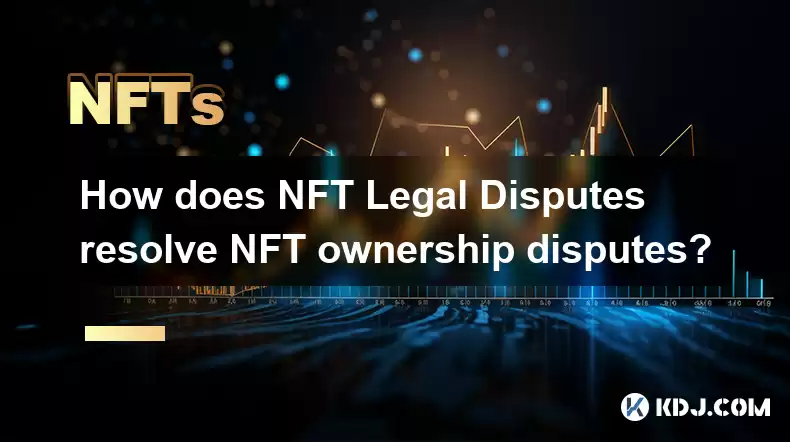
Key Points:
- NFT ownership disputes often arise from unclear terms of service, technical glitches, or fraudulent activities.
- Legal resolution depends heavily on the specific platform and jurisdiction.
- Smart contracts play a crucial role, defining ownership and transfer rules.
- Courts may rely on blockchain evidence and expert testimony to determine rightful ownership.
- Alternative dispute resolution methods, like arbitration, can be more efficient.
- Legislation regarding NFTs is still developing, leading to legal uncertainty.
How Does NFT Legal Disputes Resolve NFT Ownership Disputes?
The burgeoning world of Non-Fungible Tokens (NFTs) has brought with it a new wave of legal complexities. NFT ownership disputes are becoming increasingly common, stemming from various sources such as ambiguous smart contract language, platform failures, or outright scams. Resolving these disputes requires navigating a relatively untested legal landscape.
One of the primary tools for determining NFT ownership is the smart contract itself. These self-executing contracts, coded onto the blockchain, dictate the rules governing NFT creation, transfer, and ownership. If a dispute arises, the smart contract’s code serves as a crucial piece of evidence, often providing a clear record of transactions and ownership history. However, ambiguities or flaws in the code can create loopholes that complicate dispute resolution.
Jurisdiction plays a significant role. Where the NFT marketplace is based, where the buyer and seller reside, and where the relevant blockchain is hosted all influence which legal system governs the dispute. This often results in jurisdictional battles, adding another layer of complexity to the process. The lack of established international legal frameworks for NFTs further exacerbates this problem.
The role of blockchain technology itself is paramount. The immutable nature of the blockchain provides a strong record of NFT transactions. Courts may utilize blockchain explorers and expert testimony to verify ownership history and trace the transfer of the NFT. However, presenting and interpreting this technical evidence requires specialized legal expertise, which can be expensive and time-consuming.
Beyond court proceedings, alternative dispute resolution (ADR) methods such as arbitration or mediation offer potentially faster and more cost-effective solutions. These methods allow for a more informal and flexible approach, potentially leading to quicker resolutions compared to traditional litigation. However, the enforceability of arbitration agreements in the context of NFTs remains an area of evolving legal interpretation.
The legal landscape surrounding NFTs is still in its infancy. Laws and regulations specifically addressing NFT ownership disputes are still developing across various jurisdictions. This lack of clear legal precedent creates uncertainty for both buyers and sellers, increasing the risk of disputes and complicating their resolution. The evolving nature of NFT technology itself also poses a challenge, requiring legal frameworks to adapt to new innovations and business models.
Another significant aspect of NFT disputes revolves around the proof of ownership. While the blockchain provides a record of transactions, it doesn't necessarily address issues of authenticity or provenance. For instance, if an NFT was created through unauthorized duplication or if the original creator’s rights are in question, the blockchain record alone may not be sufficient to resolve the dispute. This necessitates a more thorough investigation into the creation and distribution of the NFT.
The burden of proof in NFT ownership disputes is also a critical consideration. Generally, the party claiming ownership bears the burden of demonstrating their rightful claim. This involves presenting evidence of purchase, transfer, and any other relevant documentation supporting their ownership. This can be challenging, particularly if the transaction occurred on an unregulated platform or involved unclear terms of service.
Intellectual property rights also frequently intersect with NFT ownership disputes. The NFT might represent ownership of an underlying digital asset, such as an image or a piece of music. Disputes can arise over copyright infringement, trademark violations, or the rights of the original creator. Resolving these disputes often requires an understanding of both NFT technology and intellectual property law.
Platforms themselves play a significant role in dispute resolution. Many NFT marketplaces have their own terms of service and dispute resolution mechanisms. These internal processes can range from mediation to arbitration, offering alternative routes to resolving disputes without resorting to formal litigation. However, the effectiveness and fairness of these internal processes can vary significantly between platforms.
The role of fraud and scams in NFT disputes cannot be overlooked. Many NFT ownership disputes stem from fraudulent activities, such as phishing scams, counterfeit NFTs, or rug pulls. Resolving these cases often requires investigation by law enforcement and collaboration with the relevant NFT platform. The lack of robust regulatory oversight in some areas of the NFT market exacerbates the vulnerability to fraudulent activities.
Frequently Asked Questions:
Q: Can I sue someone for stealing my NFT?
A: Yes, you can potentially sue someone for stealing your NFT, but success depends on proving ownership and the jurisdiction's laws. The blockchain record, smart contract, and evidence of purchase will be key.
Q: What if the NFT marketplace disappears?
A: If the marketplace disappears, proving ownership becomes more challenging. However, the blockchain record of the NFT's existence and transfer history remains. This can be crucial evidence in legal proceedings.
Q: What is the role of smart contracts in resolving disputes?
A: Smart contracts define the terms of ownership and transfer. If clear and unambiguous, they provide strong evidence in court. Ambiguous contracts, however, can create grounds for disputes.
Q: Are there any specific laws governing NFT ownership disputes?
A: Currently, there's no single, universally applicable law for NFT ownership disputes. The applicable laws depend on the jurisdiction and the specifics of the case, drawing upon existing contract, property, and intellectual property laws.
Q: How can I protect myself from NFT ownership disputes?
A: Thoroughly review smart contracts, ensure clear ownership terms, use reputable marketplaces, and document all transactions. Seek legal counsel when necessary, especially for high-value NFTs.
Disclaimer:info@kdj.com
The information provided is not trading advice. kdj.com does not assume any responsibility for any investments made based on the information provided in this article. Cryptocurrencies are highly volatile and it is highly recommended that you invest with caution after thorough research!
If you believe that the content used on this website infringes your copyright, please contact us immediately (info@kdj.com) and we will delete it promptly.
- Cryptocurrency, Altcoins, and Profit Potential: Navigating the Wild West
- 2025-08-04 14:50:11
- Blue Gold & Crypto: Investing Disruption in Precious Metals
- 2025-08-04 14:30:11
- Japan, Metaplanet, and Bitcoin Acquisition: A New Era of Corporate Treasury?
- 2025-08-04 14:30:11
- Coinbase's Buy Rating & Bitcoin's Bold Future: A Canaccord Genuity Perspective
- 2025-08-04 14:50:11
- Coinbase's Buy Rating Maintained by Rosenblatt Securities: A Deep Dive
- 2025-08-04 14:55:11
- Cryptos, Strategic Choices, High Returns: Navigating the Meme Coin Mania
- 2025-08-04 14:55:11
Related knowledge
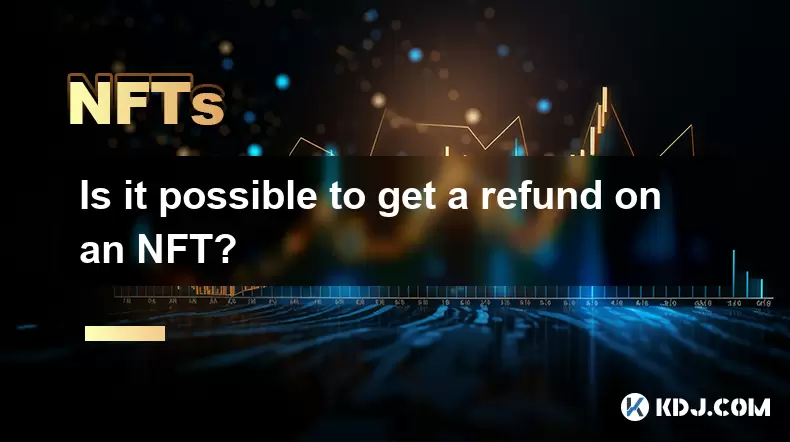
Is it possible to get a refund on an NFT?
Jul 21,2025 at 08:35pm
Understanding NFT Transactions and RefundsWhen you purchase an NFT (Non-Fungible Token), the transaction is typically recorded on a blockchain, making...
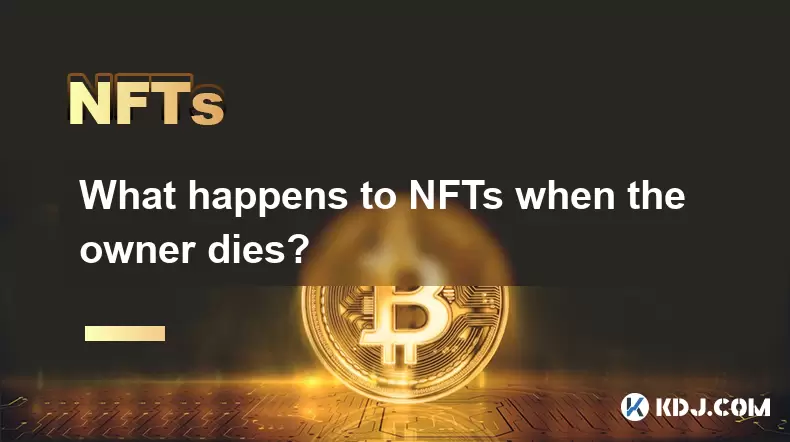
What happens to NFTs when the owner dies?
Jul 22,2025 at 02:43pm
Legal Ownership and Digital AssetsWhen an individual owns NFTs, the question of what happens to these assets upon their death is a pressing one. NFTs ...
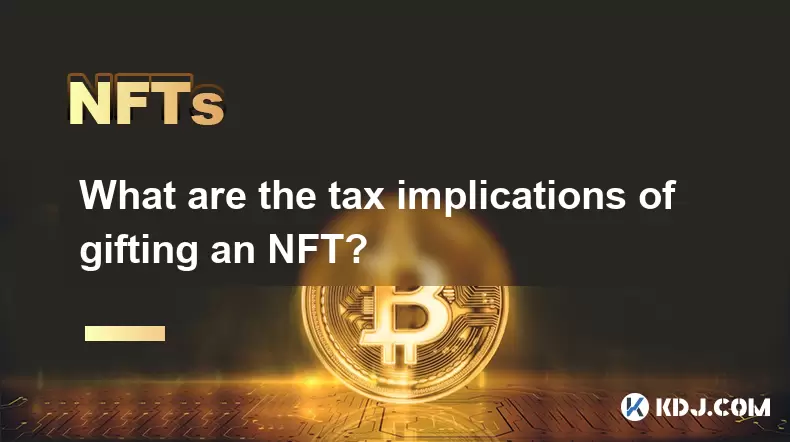
What are the tax implications of gifting an NFT?
Jul 19,2025 at 04:21am
Understanding the Basics of NFT GiftingGifting a Non-Fungible Token (NFT) involves transferring ownership from one individual to another without recei...
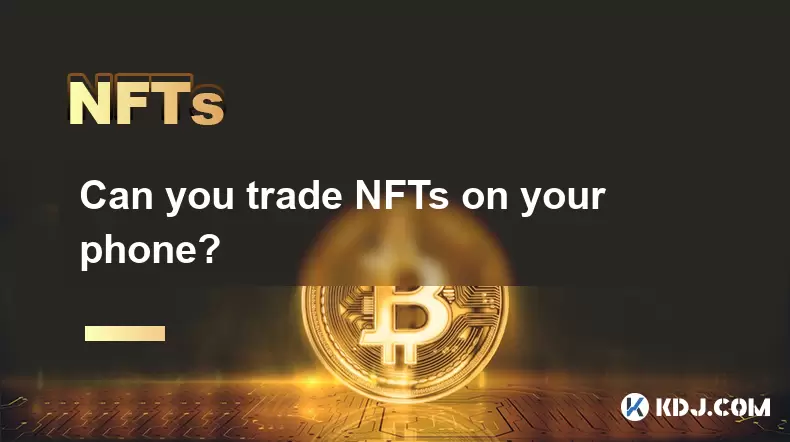
Can you trade NFTs on your phone?
Jul 18,2025 at 04:29am
Trading NFTs on Mobile DevicesYes, you can trade NFTs on your phone, and the process has become increasingly streamlined thanks to a variety of mobile...
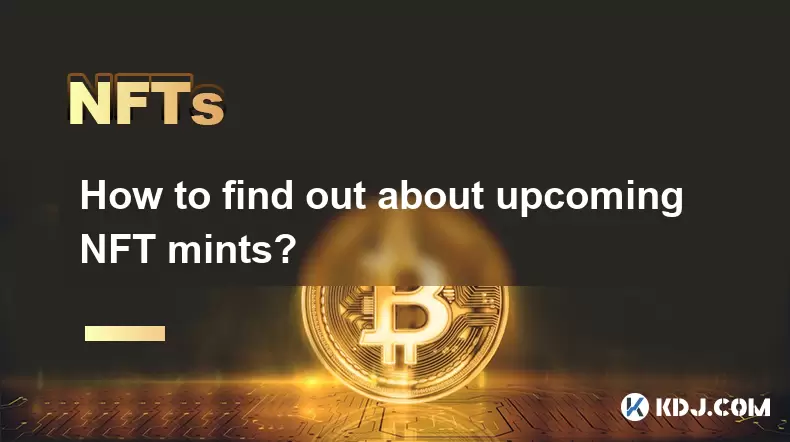
How to find out about upcoming NFT mints?
Jul 18,2025 at 11:50am
Exploring NFT Minting OpportunitiesUnderstanding the landscape of upcoming NFT mints is crucial for collectors, investors, and creators who wish to st...
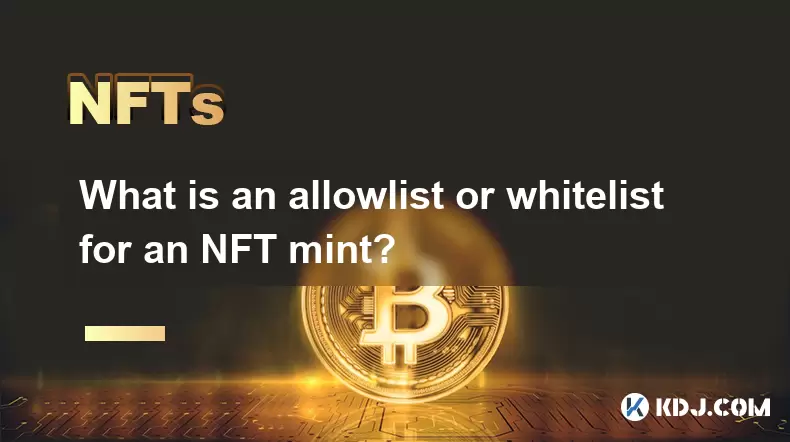
What is an allowlist or whitelist for an NFT mint?
Jul 20,2025 at 07:14pm
Understanding the Concept of an Allowlist for NFT MintingAn allowlist, also commonly referred to as a whitelist, is a mechanism used in the NFT mintin...

Is it possible to get a refund on an NFT?
Jul 21,2025 at 08:35pm
Understanding NFT Transactions and RefundsWhen you purchase an NFT (Non-Fungible Token), the transaction is typically recorded on a blockchain, making...

What happens to NFTs when the owner dies?
Jul 22,2025 at 02:43pm
Legal Ownership and Digital AssetsWhen an individual owns NFTs, the question of what happens to these assets upon their death is a pressing one. NFTs ...

What are the tax implications of gifting an NFT?
Jul 19,2025 at 04:21am
Understanding the Basics of NFT GiftingGifting a Non-Fungible Token (NFT) involves transferring ownership from one individual to another without recei...

Can you trade NFTs on your phone?
Jul 18,2025 at 04:29am
Trading NFTs on Mobile DevicesYes, you can trade NFTs on your phone, and the process has become increasingly streamlined thanks to a variety of mobile...

How to find out about upcoming NFT mints?
Jul 18,2025 at 11:50am
Exploring NFT Minting OpportunitiesUnderstanding the landscape of upcoming NFT mints is crucial for collectors, investors, and creators who wish to st...

What is an allowlist or whitelist for an NFT mint?
Jul 20,2025 at 07:14pm
Understanding the Concept of an Allowlist for NFT MintingAn allowlist, also commonly referred to as a whitelist, is a mechanism used in the NFT mintin...
See all articles

























































































